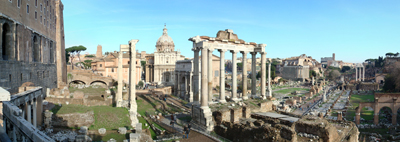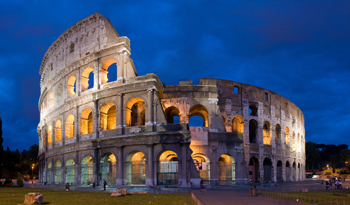For Sunday September 18, 2016
Lectionary Readings (Revised Common Lectionary, Year C)
Jeremiah 8:18–9:1 or Amos 8:4–7
Psalm 79:1–9 or Psalm 113
1 Timothy 2:1–7
Luke 16:1–13
"Pray for the king," says Paul in this week's epistle, "and for all those in authority." "Submit yourselves to the governing authorities," he tells the believers in Rome.
That's provocative instruction for our presidential election.
When my wife and I were walking around the ruins of Rome this past summer, both sacred and secular, I kept wondering how the early believers related to the Roman state and society. Did they go to those gruesome games in the Coliseum? Run for elected office? Serve in Rome's military?
In his History of the Decline and Fall of the Roman Empire (1776), Edward Gibbon argued that the success of the early Christians was based upon their "intolerant zeal" of Roman ways. That is, the new faith was utterly incompatible with and "obstinately different" from the old ways of the ancient empire.
There are some early texts that support this oppositional paradigm, like the one by a Roman lawyer and Christian named Minucius Felix of the early third century. He wrote a dialogue between a Christian named Octavius and a pagan critic called Caecilius. Whether the dialogue is actual history or just a literary device isn't clear. What's clear, though, is that in this telling, Roman believers lived on the cultural fringes.
Since the Christian sect was new and novel, and couldn't claim an ancient pedigree, it was automatically suspect. Many of its adherents were also "unlettered and unlearned" (Clarke), or in Caecilius's snobbery, "utter boors and yokels, ungraced by any manners or culture."
In style and content their Scriptures were crude. They believed absurd doctrines like the resurrection of the body and providence. Rumors about their cannibalism, incest, and infanticide were well known.
And so, Caecilius complains and condescends at length:
"They despise our temples as being no more than sepulchers, they spit after our gods, they sneer at our rites, and, fantastic though it is, our priests they pity — pitiable themselves; they scorn the purple robes of public office, though they go about in rags themselves."
"You do not go to our shows, you take no part in our processions, you are not present at our public banquets, you shrink in horror from our sacred games, from food ritually dedicated by our priests, from drink hallowed by libation poured upon our altars. Such is your dread of the very gods you deny. You do not bind your head with flowers, you do not honor your body with perfumes; ointments you reserve for funerals, but even to your tombs you deny garlands; you anemic, neurotic creatures, you indeed deserve to be pitied — but by our gods. The result is, you pitiable fools, that you have no enjoyment of life while you wait for the new life which you will never have… If you have not been privileged to understand the concerns of a citizen, you most surely have been denied discussion of the affairs of heaven."
Then comes the clincher. The Christians, griped Caecilius, "do not understand their civic duty." They were outliers.
Writing at the end of the second century, Tertullian imagines a huge chasm between faith and culture: "What has Athens to do with Jerusalem?" Elsewhere he indicates that Christians didn't or shouldn't serve in the military.
 |
|
The Roman Forum.
|
Believers lived on the periphery: "We Christians shrink from all burning desires for renown and position… there is nothing more foreign to us than affairs of state."
But just a few paragraphs before this black and white statement, Tertullian strikes a very different chord. He boasts that believers had permeated every level of Roman society: "We are only of yesterday and have filled everything you have: cities, apartment blocks, forts, towns, marketplaces, even the military camps, tribes, town councils, the palace, the senate, the forum. We have left you only the temples."
Were there believers in the Roman senate by the late second century? Debating in the Forum, the very center of civic life? Or would a conscientious believer back then have shunned such worldly places? You can read Tertullian both ways.
Writing in the middle of the third century down in Alexandria, Egypt, Origen responds to the pagan critic Celsus, who had urged believers to help the king with all our might, and to labor with him in the maintenance of justice, to fight for him; and if he requires it, to fight under him, or lead an army along with him.
Origen responded to Celsus by invoking the epistle for this week. Believers do play their part in public affairs, he says — albeit on their own terms and in their own ways:
"And as we by our prayers vanquish all demons who stir up war, and lead to the violation of oaths, and disturb the peace, we in this way are much more helpful to the kings than those who go into the field to fight for them. And we do take our part in public affairs, when along with righteous prayers we join self-denying exercises and meditations, which teach us to despise pleasures, and not to be led away by them. And none fight better for the king than we do. We do not indeed fight under him, although he require it; but we fight on his behalf, forming a special army — an army of piety — by offering our prayers to God."
In his book Coming Out Christian; How the Followers of Jesus Made a Place in Caesar's Empire (2015), Douglas Boin, a classicist, historian, and archaeologist at St. Louis University, rejects Gibbons's characterization of Christians as zealous sectarians. His book offers a refreshingly nuanced interpretation.
Boin says that there were many, different ways to be both Roman and Christian. He argues that the early believers lived hyphenated lives and "juggled their identities in highly creative ways." They lived in a middle ground characterized by many shades of gray.
For the most part, early believers were just ignored, even "entirely invisible" when judged by the paucity of their archaeological remains. New scholarship suggests that they weren't as persecuted as some standard histories suggest. In addition to confessing their faith, at least some believers served in the military, went to the games, enjoyed the festivals, and attended the theaters, just like their neighbors.
 |
|
Roman Coliseum.
|
For them, the Roman state wasn't the whore of Babylon or the great dragon of John's Revelation, but a fascinating place to live, and an institution ordained by God. Boin discerns a pattern not of hostility and withdrawal, not of some zero sum game, but one of engagement and dialogue.
In short, believers did their best to fit in with what he calls "shared civic values," which is just what we read in the epistles — wives were to obey their husbands, slaves their masters, and all believers were to "honor the emperor" and "live at peace with all people."
And yes, pray for the king.
Before too long, there came a remarkable historical paradox: the greatest persecutor of the church (the Roman state) became its biggest supporter (Constantine) and the center of its ecclesiastical power (the Roman papacy).
But then, observes Boin, came an ominous turn. By the late fourth century, this civic participation by Christians had eroded into violent cultural clashes — the burning of a synagogue, the destruction of a pagan temple, and government legislation that punished non-believers. We've been living with the sad consequences ever since.
For further reflection
The poet-farmer Wendell Berry once observed that he was neither a conservative nor a liberal, but "stuck in the middle and most uncomfortable."
Image credits: (1) Wikipedia.org and (2) Wikipedia.org.





